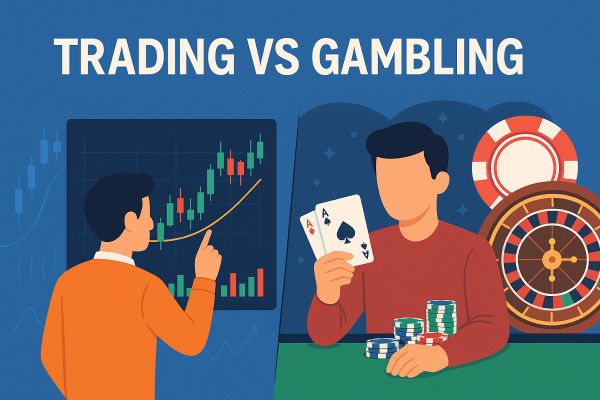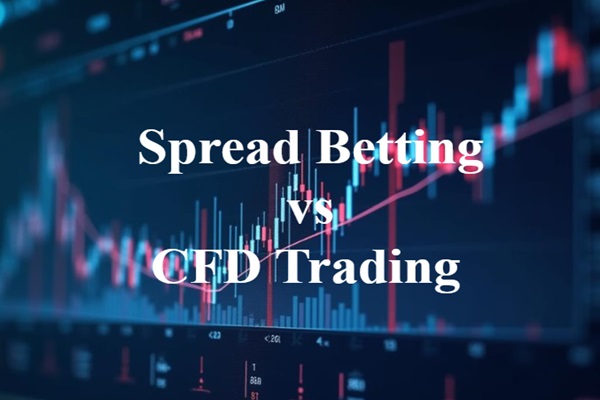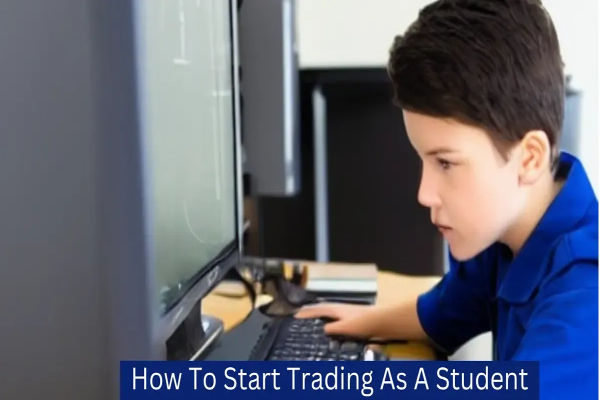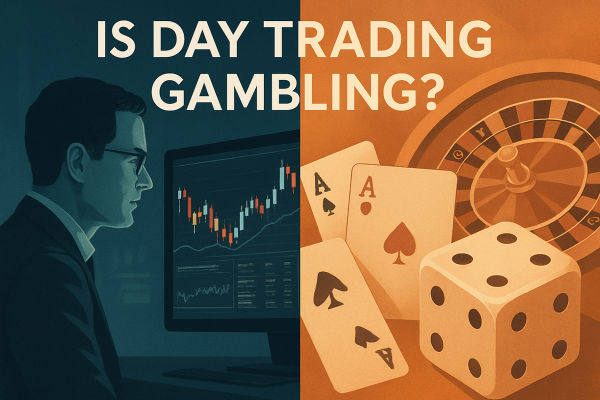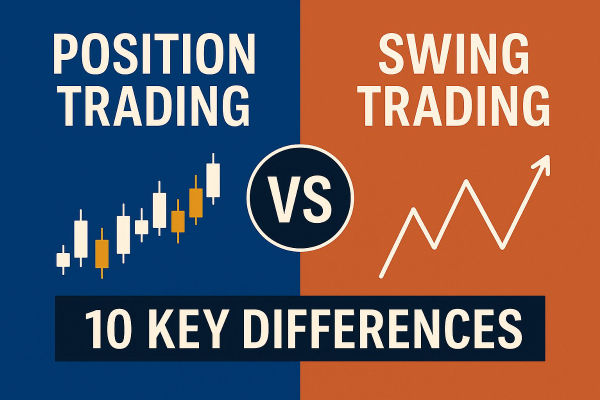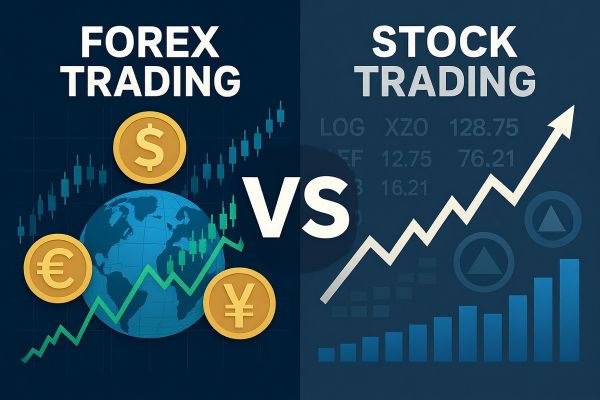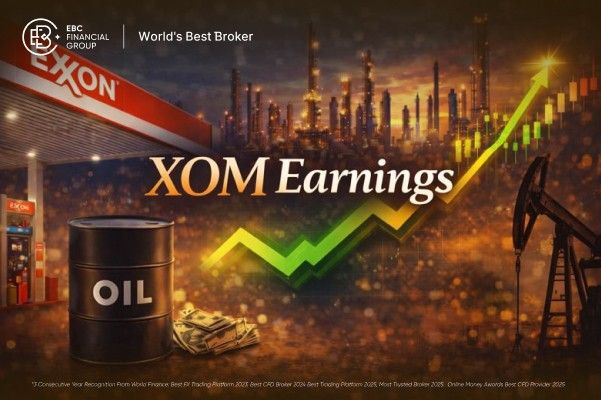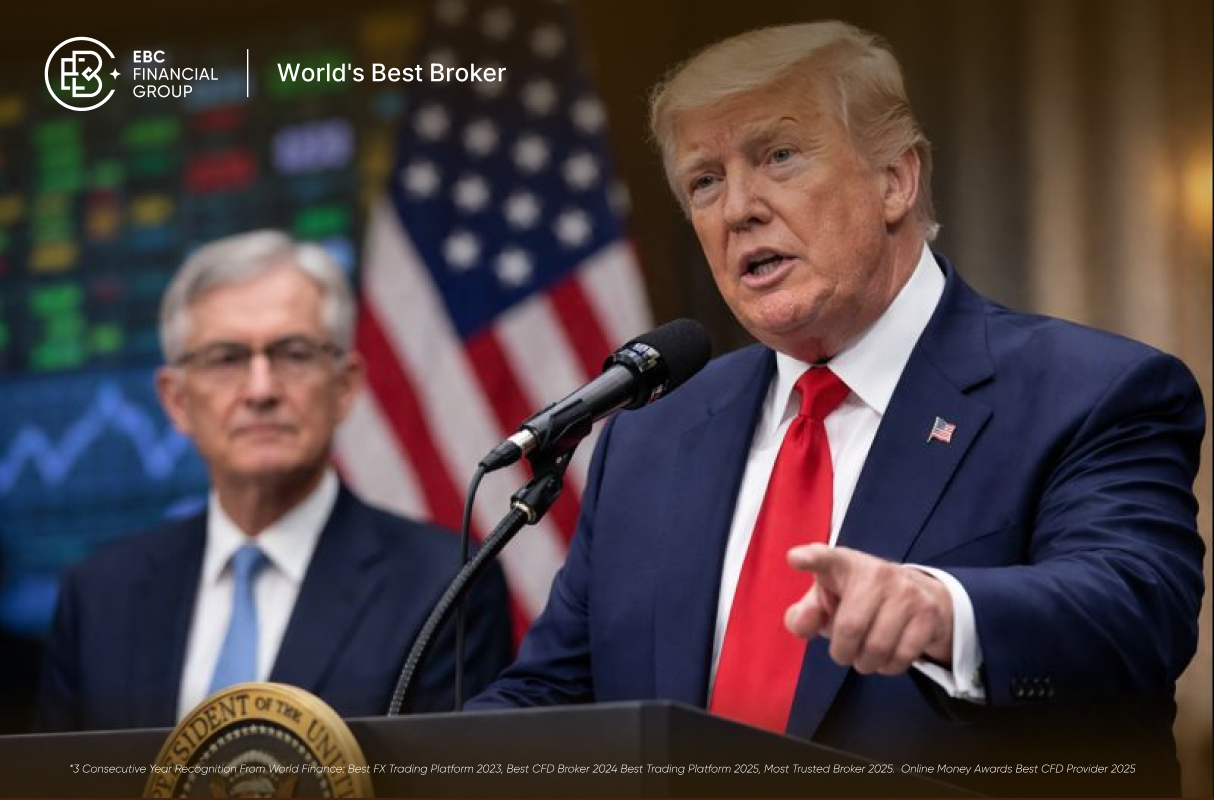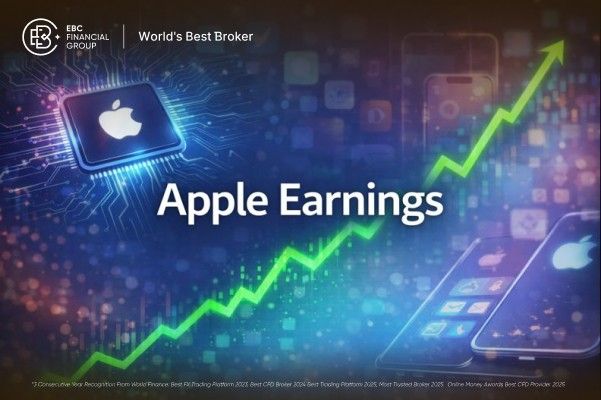To an outsider, financial markets can look like a high-stakes casino. Screens flash red and green, fortunes change quickly, and traders experience both highs and lows. This resemblance contributes to the belief that trading and gambling are alike.
Before entering the markets, it’s crucial to understand these differences. Many beginners struggle not because trading is rigged, but because they approach it like gambling. Recognising the gap between trading and gambling can mean the difference between burning out fast and building lasting success.

1. Purpose and Mindset: Building Wealth vs Chasing Thrills
The first major split between trading vs gambling lies in purpose. Gambling exists to entertain and excite. Casinos are deliberately designed to blur time, intensify emotions, and create sensory overload. Gamblers enter expecting to lose and hoping to get lucky. Their aim is instant gratification.
Traders operate with a completely different mindset. Their purpose is not thrills but growth. They view every trade as one small decision in a long-term plan. They expect losing trades but seek to win consistently over hundreds of them. This perspective removes the emotional spikes that gambling thrives on.
2. Risk Management: How Traders Protect Capital While Gamblers Don’t
Risk management marks one of the clearest lines in trading vs gambling. Gambling is inherently all-or-nothing. Once a wager is placed, the full stake is exposed to loss, and nothing can stop that. Gamblers who hit losing streaks often increase their bets to recover, a pattern called “tilting” that accelerates their collapse.
Trading treats risk as something to control, not ignore. Professional traders only risk a small percentage of their account on any single trade. They use stop-losses to exit losing positions automatically, diversify across instruments, and calculate position sizes to withstand volatility. Their entire process revolves around survival.
3. Skill and Analysis: Studying Markets vs Trusting Luck
Skill has little impact on gambling outcomes. No amount of studying past slot machine spins or roulette results can change the odds. Even skill-based games like poker give the house a statistical edge. In the long run, luck always fades.
Trading flips that reality. Skill is the foundation. Traders spend years learning technical analysis, price action, and macroeconomic drivers. They study charts, news, and earnings reports. They backtest strategies on historical data and refine them through experience. Over time, skill compounds.
4. Control Over Outcomes: Active Decision-Making vs Powerless Guesswork
Once a gambler places a bet, control ends. They can’t influence how dice land or what cards appear. They surrender to luck and hope it favours them.
Traders hold control at every stage. They decide when to enter trades, how large to make them, when to cut losses, and when to take profits. They can choose to stand aside when conditions are uncertain. This power to shape outcomes fundamentally separates trading vs gambling.
5. Probabilities and Edge: Creating an Advantage vs Fighting the House
Casinos operate on fixed probabilities that guarantee the house wins over time. Gamblers may get lucky in the short run, but the math ensures losses eventually. They can never change the odds.
Markets are fluid and unscripted. They move on human behaviour, news, and supply-demand shifts. Traders can spot patterns and exploit them, building statistical edges that win slightly more than they lose. Over hundreds of trades, even a 55% edge with good risk-reward ratios can generate growth.
6. Emotional Discipline: Why Feelings Break Gamblers but Build Traders
Emotion drives gambling. The highs of winning and the lows of losing push gamblers into reckless behaviour. Many double their stakes after losses to “win it back,” often wiping out everything.
Traders cannot survive with that mindset. They deliberately build emotional discipline—using predefined rules, journaling trades, and automating exits to avoid panic. They see emotions as noise that clouds judgment. This discipline lets them keep acting rationally even in losing streaks.
7. Long-Term Sustainability: Compounding Capital vs Guaranteed Decline
The final and ultimate distinction in trading vs gambling is sustainability. Gambling is mathematically designed to cause long-term losses. Even skilled players eventually succumb to the house edge. The more they play, the more they lose.
Trading, done correctly, can last for decades. Because traders control risk, build skill, and compound gains, they can grow wealth across a lifetime. This is why professional trading firms exist while professional gambling careers rarely survive.
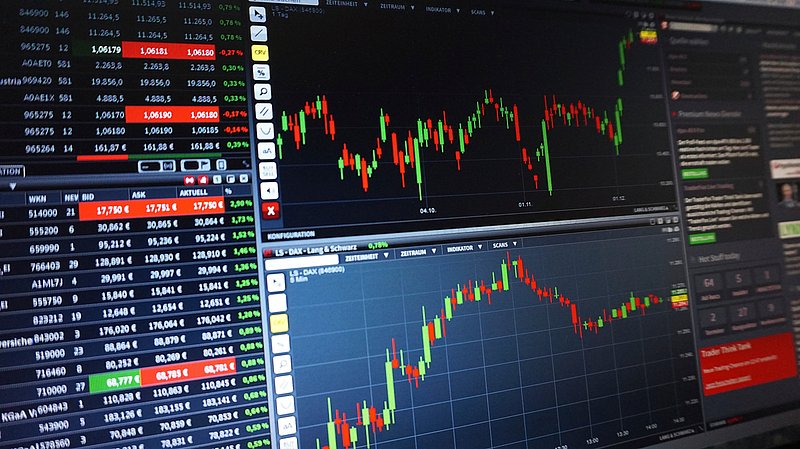
FAQs About Trading vs Gambling
Q1. Why do people think trading is just another form of gambling?
Because both involve risking money on uncertain outcomes, they look similar from the outside. But the similarity is superficial. Gambling relies purely on chance and fixed odds that guarantee eventual losses. Trading uses analysis, planning, and risk controls to tilt probabilities in the trader’s favour. Over time, skill matters in trading; in gambling, it does not.
Q2. Can trading turn into gambling without someone realising it?
Yes. This happens when traders abandon their plans, chase losses, or trade out of boredom or emotion. They stop using analysis and discipline, and start placing impulsive bets. At that moment, they are no longer trading—they are gambling in disguise. The difference between trading vs gambling lies not in the platform but in the behaviour behind it.
Q3. How does risk management draw the line between trading and gambling?
Risk management is the clearest dividing line. Traders risk only a small percentage of their account per trade, use stop-losses to cap damage, and diversify their positions. Gamblers do none of these things. Risk control turns uncertainty into something manageable, while the absence of it turns trading vs gambling into the same reckless gamble.
Conclusion
Trading vs gambling might appear similar—both involve risk, speed, and emotional highs—but they are opposites at their core. Gambling depends on luck, emotion, and inevitable loss. Trading depends on skill, structure, and discipline. One is designed to drain capital. The other, done correctly, is designed to build it.
The confusion persists because many beginners trade like gamblers: risking too much, chasing losses, and ignoring plans. But trading only becomes gambling when it’s approached like gambling. When treated as a business—with clear rules, risk controls, and emotional discipline—it becomes a sustainable craft instead of a fleeting thrill.
Disclaimer: This material is for general information purposes only and is not intended as (and should not be considered to be) financial, investment, or other advice on which reliance should be placed. No opinion given in the material constitutes a recommendation by the author that any particular investment, security, transaction or investment strategy is suitable for any specific person.
